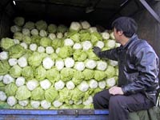 To tide over winter life Beijingers usually bought among three vegetable species --Dabaicai (Chinese cabbage), potato and radish as the commonest three vegetable items known to people's baskets of old. Especially in the first few harvesting and marketing days of cabbage, people were seen in long queues for cabbages on every selling ground while children chased one another among "cabbage hills". Now the scene has gone forever, and, as Beijing people said, who would still go to the trouble to store cabbages, since we can find everything we want on the market?
To tide over winter life Beijingers usually bought among three vegetable species --Dabaicai (Chinese cabbage), potato and radish as the commonest three vegetable items known to people's baskets of old. Especially in the first few harvesting and marketing days of cabbage, people were seen in long queues for cabbages on every selling ground while children chased one another among "cabbage hills". Now the scene has gone forever, and, as Beijing people said, who would still go to the trouble to store cabbages, since we can find everything we want on the market?
With diversified vegetable varieties grown and put to sale as on today's markets, "Dabaicai", being no longer a "political cabbage to all households" as in the days of market shortage, has retired as " the number one and only one" vegetable dominating the tables of Beijingers one winter after another.
Fewer ?Cabbage Walls? on Street
The days come at long last for buying cabbages, but long queues are no more. At Ganjiakou vegetable market, the reporter only saw a scattering of people choosing amidst cabbages only with a few heads bought.
Xun Xilin, a senior Beijinger told reporter that in the past every household had to store at least 50-100kg of cabbages to tide over the family's winter life, but people now go to no such trouble. On Xun's tricycle, four heads of cabbage were lying tranquilly amidst a choice stock of cucumbers, tomatoes and spinach.
Due to limited vegetable supply in winter, people got used to store at least 50kg cabbages for every household. To guarantee even limited market supply, related departments went to great lengths to make sure the farmers were helped with necessary services provided for cabbage production.
In 1997, Beijing lifted control on cabbage planting area and pricing, and citizens reacted calmly to the first-year market-led vegetable supply.
Then a waning position of cabbages was seen with its planting area decreased from 1997's 13,000 hectares to no more than 10,000 hectares this year. The city's total production this year is expected at 770 million kg, 28 percent less than that of the previous year. The market supply will be 540 million kg, also less than the year before.
Thanks to the decade-old "vegetable basket" program, Beijing people have seen diversified vegetables on their winter table, and now markets are filled with cucumber, tomato, pepper, spinach and eggplant, as well "new faces" such as lettuce and green cauliflower, said an agriculture official.
In recent years the city has set up 17000-hectare greenhouse production base, and now more than 300 kinds of vegetables are available on market, including 30 kinds that supplied daily. Besides, vegetables from southern provinces as Hainan, Yunnan and Guizhou also rushed into Beijing, in a market share over 50 percent of the city's vegetable varieties.
Special Species No Longer Beyond People's Reach
In a warm, humid greenhouse at the Xiaotangshan special vegetable production base, three or four young women are picking "mini cucumber" and Gynura, which may be on the table of Beijing citizens a few hours later.
Entering the two-layer air-staffed greenhouse introduced from France at a cost of 3 million yuan, the reporter was astonished by the full-closure, full-automatic vegetable production mode.
The production base was built in the 80s to meet the demand of foreign visitors, with its vegetables mainly supplied to restaurants and hotels, said production chef Yang Fugang. During recent years more than 400 improved varieties were introduced from overseas and south China, and now more than 160 varieties are planted yearly, including 70 put into market.
With improved living standards and promoted agricultural technology, prices of these special vegetables have been decreasing, Yang added. For example, the color pepper introduced from Israel and Holand was sold at 70 to 100 yuan ( about US$8.4-12) per kg during 1999 New Year times, now it is available at supermarkets at a price of 10 yuan per kg.
From ?Eat According to A Tight Supply? to ?Eat What They Want?
In the past people ate "according to a tight supply" and now they "eat what they want", and it is no longer necessary to store cabbages as a rich supply of fresh vegetables is provided, said Gu Zhaoxue, assistant manger of Beijing's Xinfadi vegetable wholesale market. He added that the market's daily transaction volume reached 7 million kg in peak times, including only no more than 0.5 million for cabbage.
Fresh vegetables available on the Xinfadi market include pepper, balsam pear, fingered citron, eggplant, aloe, lily and cactus shipped in from more than 30 provinces, cities and autonomous regions across the nation. What's more, the market also signed contracts with 101 national vegetable supply bases to ensure that safe, pollution-free vegetables are supplied in Beijing.
(People?s Daily November 15, 2002)
|

